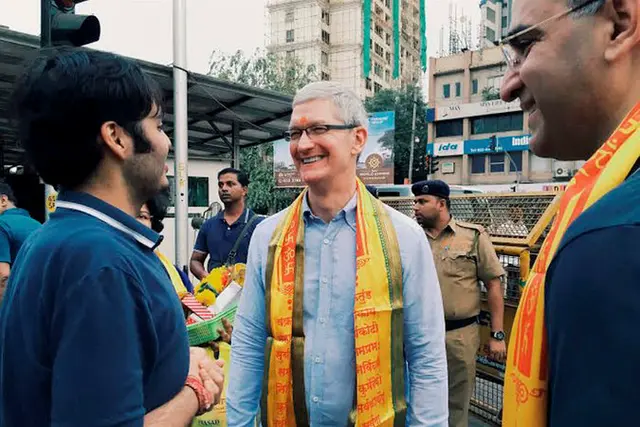After months of delays,Appleis likely to open its first retail stores in India, a fast-growing market for smartphones where the American technology giant has little presence.
New rules issued by the Indian government on Mondayexempt foreign-owned companies that want to open stores selling a single brand of products from requirements that 30 percent of the content of those products come from India. The exemption, which lasts three years, can be extended to eight years in the case of companies selling“cutting edge” items, such as Apple’s iPhones and Macs.
Apple, which makes virtually all of its devices in China, lobbied for months for the loosening, andTimothy D. Cook, the company’s chief executive, discussed it with government officials during his first visit to India last month.
An Apple spokesman declined to comment on the issue on Monday. The company has not yet received any formal response from the Indian government on its application to open stores.
By themselves, new stores will have little impact on Apple’s small market share in India, beyond serving as a marketing tool. Although Indians will buy an estimated 139 million smartphones this year, Android models that cost less than $120 dominate the market, according to the Gartner research firm.
Apple says its sales in India grew 56 percent during its last fiscal quarter, but its cheapest phones typically run $400 or more. Its total annual sales in India were around two million units last year, according to Gartner.
The policy changes, which also affect other sectors like the military and aviation, are the latest effort by the government of Prime Minister Narendra Modi to make India more predictable for foreign technology companies — even if the rules do not always work exactly as planned.
In March, the governmentdeclared that online retailers that sell many brands, including Amazon, are legal under Indian law, which had been a gray area. However, it also said that such retailers could not sell goods directly to consumers, but instead must serve as marketplaces for third-party merchants. That threatened to upend the business structure of Amazon as well as local competitors likeFlipkartwhile protecting local merchants.
Last month, after years of threatening to impose stiff taxes on venture capitalists and other foreign investors in India, the Indian government struck a new treaty with Mauritius, a tax haven used by many foreign companies to move money in and out of India tax-free, to phase out the tax breaks. Foreign investors will soon have to pay a modest tax on capital gains in India, but the uncertainty is over.
Kanwal Rekhi, managing director of Inventus Capital Partners, a venture capital firm with a long history of investing in India, said the series of clarifications had been a long time in coming. “These are not things that require change of law,” he said. “Modi is an improvement over what we had, but he is still hesitant.”
Mr. Rehki said that Monday’s policy announcements would have little impact on the overall technology industry in India, which is already open to start-ups as well as giants like Facebook, Google, Microsoft and Oracle.
But it will certainly help Apple open its first stores in the country. Analysts said the new rules effectively would give Apple — as well as major Chinese phonemakers likeXiaomiandLenovo— the ability to set up shops in India to showcase their wares.
Opening stores will allow Apple to deliver to Indian customers the full Apple experience — artful displays staffed by informed sales representatives, “genius bars” to help solve problems and a carefully curated set of accessories.
“People feel pride after buying an iPhone, that’s what Apple is all about,” said Anshul Gupta, a personal technology analyst with Gartner in Mumbai. “That’s how they maintain the premium image.”
The Indian government has not yet acted on Apple’s request to address the low end of the market by importing and selling used phones with a new warranty. The company has indicated it would do some of the refurbishing in India, creating local jobs.
Mr. Gupta said that Indian consumers were becoming more affluent, and that if Apple could capture the top 5 to 10 percent of India’s smartphone sales, that would be a large new market. “It is not an overnight story, but there is a huge potential,” he said.
Apple is making other commitments to India. During Mr. Cook’s visit, he announced the tech giant would be opening anew development center in Hyderabad, focused on map technology, that would create up to 4,000 jobs. The company also opened atech accelerator in Bangaloreto encourage more local app developers to write software for Apple products.
Apple, slow to warm to India, “now wants to catch up its lost ground, ” said Arvind Singhal, chairman of Technopak, a business consulting firm in New Delhi.
(THE WALL STREET JOURNAL)
 简体中文
简体中文





